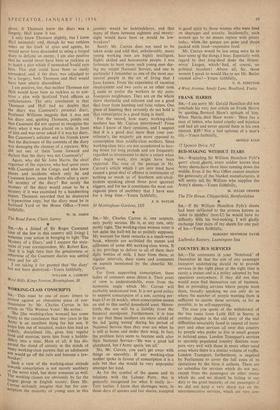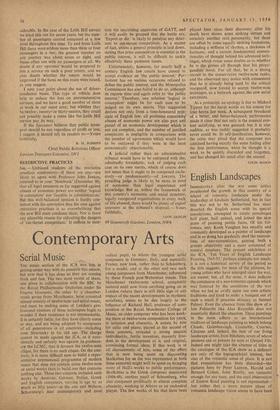SIR,—The comments in your 'Notebook' of December 1.6 that the
aim of any passenger transport undertaking should be to provide services in the right place at the right time is surely a truism and is a policy adopted by bus operators everywhere; if they did not they would soon find themselves out of business. But in providing services where people want them, broadly speaking we can only do so where the number of people wanting them is sufficient to enable those services, as far as possible, to be self-supporting.
The case you quote of the withdrawal of the bus route from Leith Hill in Surrey is another chapter in the old story of the real difficulties invariably faced in respect of trans- port and other services all over this country by people who prefer to live in small groups in isolated areas. London Transport's services to sparsely populated country districts- com- pare very well with those in many other rural areas where there is a similar volume of traffic. London Transport, furthermore, is required by Parliament to cover the full costs of its operations by the fares it collects. There are no subsidies for services which do not pay, except from the passengers on other routes which do, and we should be failing in our duty to the great majority of our passengers if we did not keep a very sharp eye on the unrenumerative services, which are very coil- siderable. In the case of the Leith Hill service we tried this out for seven years, but the num- ber of passengers carried remained at a low level throughout this time. To and from Leith Hill there were seldom more than three or four passengers in a bus; the greatest number on any journey was about seven or eight, and buses often ran with no passengers at all. We doubt if any operator' would be prepared to run a service on such a poor return, and we also doubt whether the return would be improved if the fares on this route were raised, as you suggest.
I note your point about the use of driver- conductor buses. This type of vehicle does help to reduce the loss on unremunerative services, and we have a good number of them at work in our outer area; but whether they be twelve-, twenty or thirty-seaters, they could not possibly make a route like the Leith Hill service pay its way.
If the Spectator believes that public trans- port should be run regardless of profit or loss,. I suggest, it should tell its readers so.—Yours faithfully,
R. M. ROBBINS Chief Public Relations Officer London Transport Executive, SW I



































 Previous page
Previous page